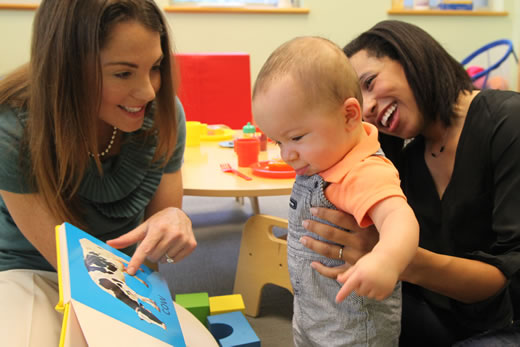Talk with your baby about everything, says Assistant Professor Ashley Darcy-Mahoney PhD RN NNP-BC. The payoff will be huge.
Darcy-Mahoney and colleagues took that message to the White House last fall when the School of Nursing and Emory's School of Medicine shared Georgia's "Talk With Me Baby" (TWMB) initiative at a daylong workshop. It was part of President Obama's call to bridge the "word gap" among America's youngest children and improve their chances for success in life. The event highlighted federal, state, and local best practices.
While the value of early word exposure has long been recognized, systematically spreading the word that social and language interaction is important to babies' development, both inside and outside the womb, is Darcy-Mahoney's goal. To that end, she and the TWMB Coalition developed a training component and public awareness campaign to help coach caregivers and parents of all Georgia babies by 2017.
In addition to Emory's nursing and medical schools, the broad coalition of TWMB partners includes the Marcus Autism Center, the Georgia departments of Public Health and Education, Atlanta Speech School, Get Georgia Reading, and Georgia Institute of Technology. "We come at this from different perspectives," Darcy-Mahoney says, "but we all have the same idea in mind: to maximize and optimize every child's potential."
Eighty-five percent of a baby's neurons are developed by age 3, so early language nutrition is key to helping bridge a 30-million word gap between children from high- and low-income families. Talking with babies from birth stimulates brain development and builds language, literacy, and social emotional skills. That's important because children who do not read at grade level by third grade are four to six times more likely to be school dropouts. This word gap can affect health outcomes, income, and family stability for decades.
TWMB integrates language nutrition coaching through presentations, webinars, and printed materials for postpartum, labor and delivery, NICU, and newborn nursery nurses, as well as Women Infants and Children nutritionists and early education professionals who see about 60 percent of all Georgia children. The goal is to help ensure that children read on grade level by the end of third grade by increasing their vocabulary and conversation skills.
Through a pilot program that targets the largest birthing centers in 13 metro-Atlanta hospitals, Darcy-Mahoney's team is training nurses how to model TWMB concepts of language nutrition as they demonstrate other skills (such as diapering and bathing) that new parents need to know before taking baby home from the hospital.
Talking with a baby (not over or around a child in third person) is far more effective than radio, TV, or video games. "Babies can hear all that, but it's the active engagement with a person that helps babies learn," Darcy-Mahoney says, noting that the Georgia Department of Health has developed TWMB videos for parents in English and Spanish.
"Including your baby in conversations and talking with them about everything can drastically improve their chances of academic success," she adds. "Our goal is for nurses to coach parents how to be baby's first teacher. Nurses are in an incredibly powerful position of trust to do that."

